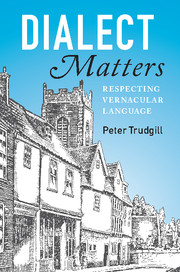Book contents
- Frontmatter
- Dedication
- Epigraph
- Contents
- Foreword
- Acknowledgements
- Map
- Themes
- 1 History: how things came to be this way
- 2 Prescriptivism and other useless pastimes
- 3 Language change: observing and accepting it
- 4 What is happening to words?
- 5 Languages and dialects in contact and conflict
- 6 Respecting English grammar
- 7 Respecting ordinary language
- 8 Sounds and fury
- 9 Respecting local speech
- 10 Grammar: the wonder of it all
- 11 More about words
- 12 Origins
- 13 Accent rules
- 14 Respecting names
- Postscript
- Index
13 - Accent rules
Published online by Cambridge University Press: 05 August 2016
- Frontmatter
- Dedication
- Epigraph
- Contents
- Foreword
- Acknowledgements
- Map
- Themes
- 1 History: how things came to be this way
- 2 Prescriptivism and other useless pastimes
- 3 Language change: observing and accepting it
- 4 What is happening to words?
- 5 Languages and dialects in contact and conflict
- 6 Respecting English grammar
- 7 Respecting ordinary language
- 8 Sounds and fury
- 9 Respecting local speech
- 10 Grammar: the wonder of it all
- 11 More about words
- 12 Origins
- 13 Accent rules
- 14 Respecting names
- Postscript
- Index
Summary
This section discusses features of our local accents, together with their history, and the ways in which these features have spread from one accent to another. The section stresses that all accents have their own rules and regularities; and that local pronunciations of particular vowels and consonants should not be considered to be “bad” or “ugly” or “wrong”: judgements of this type are always social in origin and have no basis in linguistic fact.
In New England
If you look at a map of New England, the region of the northeastern USA which consists of Connecticut, Maine, Massachusetts, New Hampshire, Rhode Island and Vermont, you can see that people from Norfolk and northern Suffolk must have played a big role in the settlement of the area. New England is full of towns with names like Attleboro, Brandon, Burnham, Framingham, Haverhill, Hingham, Lynn, Newmarket, Norfolk, Norwich, Rockland, Thetford, Walpole, Windham, Wolcott and Yarmouth. Some of these names occur more than once: there is a Windham in New York, a Windham in Vermont and a Windham in Connecticut; and there is a Norwich in Connecticut, and another one in Vermont.
Puritanism was a big thing in seventeenth-century East Anglia, and the Pilgrim Fathers included plenty of migrants who would have been EDP readers if there had been such a thing at the time. So you would think, then, wouldn't you, that there would be at least a trace of our local Norfolk and Suffolk dialects in the way people speak over there today, even allowing for the fact that nearly 400 years have passed since the arrival of the Mayflower in North America?
There are a number of distinctive features in the speech of the people of eastern New England which distinguish them from other Americans. One of these is a pronunciation which American dialectologists call “the New England short o”. This refers to a short pronunciation of words like home, stone and road which is not found anywhere else in the USA. Americans represent this pronunciation by writing ‘hum’, ‘stun’, ‘rud’.
Don't you think this sounds rather like something you can hear any day walking around Norwich market? People with truly local accents in our part of the world also pronounce home, stone and road with a short vowel.
- Type
- Chapter
- Information
- Dialect MattersRespecting Vernacular Language, pp. 186 - 195Publisher: Cambridge University PressPrint publication year: 2016



